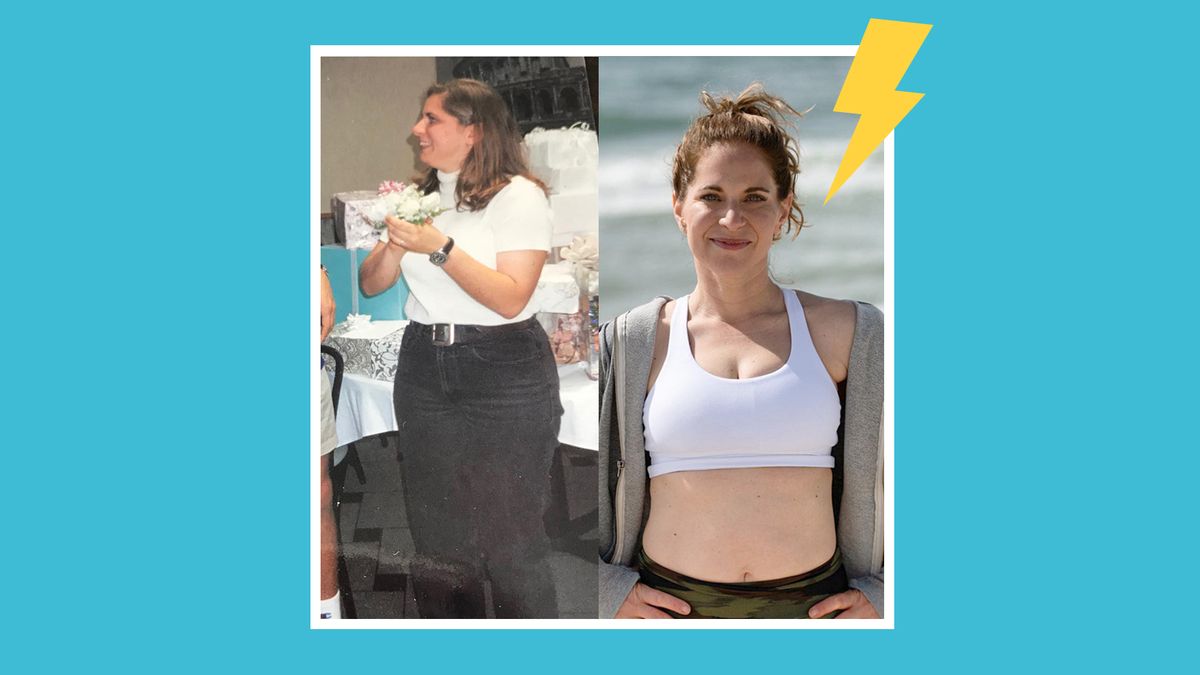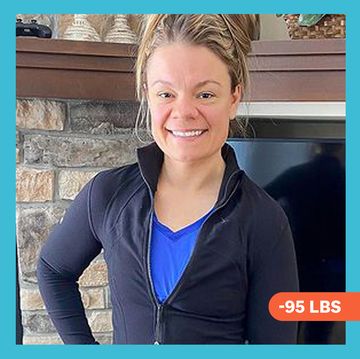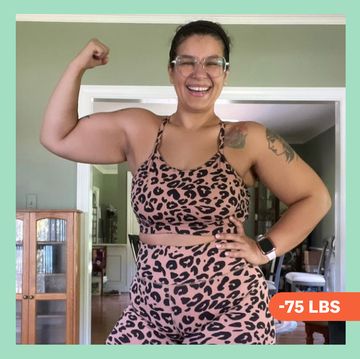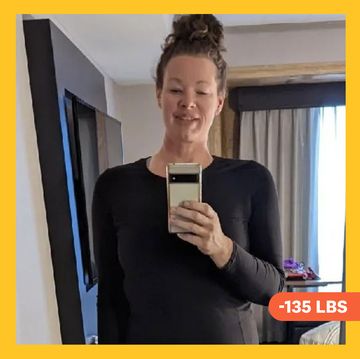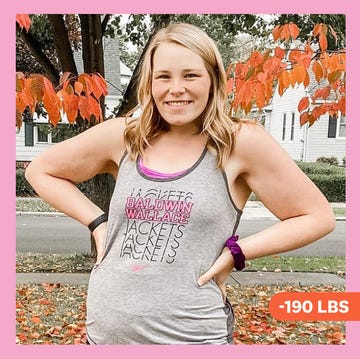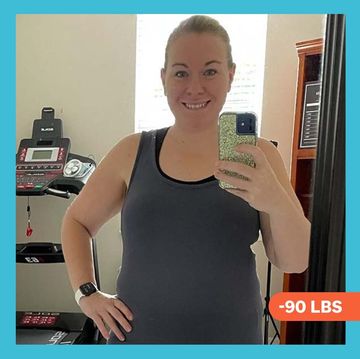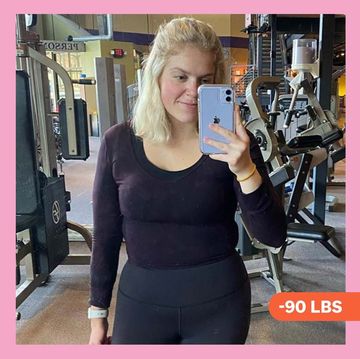Real talk: Weight loss can be complicated. There is no one-size-fits-all approach or hot tip. What works for your friend won’t necessarily be a good match for you. But there is one consistent theme in weight loss that experts swear by: The way you approach it from a mental standpoint will have an impact on whether you’re able to actually lose weight—and keep it off.
“Mindset is basically the same as attitude,” says Sonya Angelone, RD, a spokeswoman for the Academy of Nutrition and Dietetics. “It affects motivation and determination, which affect compliance to any program.”
Your mindset has so much to do with staying motivated and how you talk yourself through your weight-loss journey, says Jessica Cording, RD, the author of The Little Book of Game-Changers. “If someone has good intentions but their mindset is not supportive of that plan, it’s going to be really hard to stay on track,” she adds.
Of course, knowing you want to have a good mindset and actually getting there are two different things. With that in mind, we spoke to real women who have successfully lost weight, along with experts, for the absolute best tips that helped them approach the process in a healthier and more sustainable way.
Meet the experts: Sonya Angelone, RD, is a nutritionist and spokeswoman for the Academy of Nutrition and Dietetics. Jessica Cording, RD, is a nutritionist and the author of The Little Book of Game-Changers.
“Ditch the short-term mindset and play the long game.”
Chicago resident Natalie Butler lost 66 pounds in 2007 on a keto and low-carb diet. But the 35-year-old says she regained it and “felt like the biggest failure ever.”
“I began to hide and miss out on life because I didn’t want people to see how I ‘failed,’” she adds. Her breaking point was when she “ruined” a trip to Cabo. “I wanted to stay in the hotel room because, like every other vacation, I set a goal to lose 30 to 40 pounds and failed. I cried the entire night, but eventually I got tired of crying and realized I was worth more than that,” she says.
So, Butler decided to focus on creating a healthier lifestyle for herself. “If you want long-term results, you have to stop thinking with a short-term mindset,” she says. “I set smaller goals. Instead of saying I’ll lose 30 to 40 pounds, I took it one day at a time and I practiced gratitude, which helped me stay motivated.” Practicing gratitude allowed her to see that she was making progress. She ultimately lost 88 pounds.
“Learn everything you can about food and how it affects your life.”
Personal trainer Marisella Villano had always struggled with her weight since she was a teenager. “I am only five feet tall, so any weight gain would be significant for me,” she says.
Eventually, Villano decided to educate herself about weight gain. “I learned everything I could about food and how food affected my life,” she says. “Understanding calories and how much you can consume without gaining weight or to help you lose weight is important to keep the weight off in the future too.”
She started exercising and went to her local gym every day for about a year. “Between exercising and watching my food intake, I was able to lose about one pound every week,” she says.
Villano ended up loving her transformation so much that she shifted careers to become a personal trainer so that she could help others get in shape. “I love empowering people through weight loss,” she says.
“Target all the reasons why you’re gaining weight.”
McKayla Schulke is a nurse in Minnesota who says she’s “lost a couple pounds here and there over the years,” but struggled to lose the weight she really wants to. “I realized that I was 100 pounds overweight, and knew I would continue to gain weight if I didn't make the necessary lifestyle changes I needed to,” she says.
She’s learned that it’s important to figure out the reason why she's gaining weight. “Because I work in the medical field, I understand that gaining weight isn't always because someone is lazy or unmotivated,” Schulke says. “A person's genetics, past medical history, life situation, and mental health are all factors that have to be considered.”
If you can figure out why you’re gaining weight, you can “take that information and form a proactive plan in how to successfully lose the weight you desire,” she says. It can help empower you to take control of the situation.
“Start with a clean slate each day.”
Whitney King is a 32-year-old mom from Colorado who started her weight-loss journey in 2014 after years of doing every crash diet imaginable.
She ate to cope with stress as a child, and gained even more weight when she was diagnosed with polycystic ovarian syndrome (PCOS) as a teenager. “I finally decided that I was done with crash dieting because I didn’t learn anything from them, they made me have a terrible relationship with nutrition and exercise, and I was tired of living in a vicious cycle of the same 20 pounds lost and gained back,” King says.
She learned to celebrate the wins, even when she had a bad day of eating. “No matter how ‘bad’ you ate the day before or if you skipped a workout, learn to start fresh the next day,” she says. “Erase the slate. Don’t live in the past, move on.”
“Don't cut out the fun foods.”
Nicole Hart, 32, says she “just couldn’t lose the weight” after having her youngest child in 2019. “I tried cutting out junk food, barely eating throughout the day…I now know that those approaches were unsustainable and part of why they didn’t work for me,” she says.
Hart has lost 20 pounds and kept the weight off since she started her weight-loss journey in 2020. Hart says weight loss clicked for her when she learned that she “didn’t need to cut out fun foods.” Instead, she adopted an 80/20 lifestyle, where 80 percent of what she eats is healthy and 20 percent is a little less healthy. “I can get in nutrient-dense whole foods, but also have room for fun foods,” she says.
“Pay attention to your thoughts around eating.”
We’re conditioned to want a treat for doing hard things, like grabbing a milkshake on the way home from a grueling workday, but that can work against your weight-loss goals, Cording points out. Figuring out what’s driving your unhealthy eating patterns, whether it’s trying to comfort yourself when you’re stressed out or feeling like you should get a treat after you’ve done something tough, can go a long way toward breaking that habit. “I’ve found that even just identifying those triggers can be really helpful for people,” Cording says.
“Figure out how much it takes to make you feel full.”
This can be tricky if you’re prone to overeating, Angelone admits. But it’s important to try to learn how much is “just enough” and “how much is too much,” she says. It typically takes your brain about 20 minutes to signal to your stomach that you’re full, and slowing down can help you learn what size portions are needed to help you feel satisfied, Angelone says. “It’s about mindful eating,” she adds.
